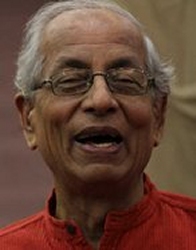Narthaki

News

Info

Featured


|   |
 e-mail: ukb7@rediffmail.com Fantasy: The Ominous and the Hilarious June 9, 2018 The proscenium stage in the eastern metropolis saw recently two significant forays into the worlds of hallucination: the one of a perilous all-encompassing autocracy and the other a boisterous rock-and-roll comedy, enveloped by a darling ghost who recites sonorously from Kalidasa's Meghadootam at eleven o'clock every night! 



1984 staged by Swapnasandhani on May 27 in Kolkata, was a very faithful adaptation of the original. Directed, adapted and scenographed with aplomb by the thespian Debesh Chattopadhyay, the play is set in a future world scenario where the protagonist Gautam (very well enacted by Ujjal Malakar) is a common citizen and a minor party functionary. His job is to rewrite history in the 'Ministry of Truth' and to bring it in line with current political thinking. He lives in a slum still shattered by a nuclear war that supposedly took place not long after World War II. The prevailing totalitarianism resembles the more sinister aspects of the erstwhile Soviet Union under Stalin when Orwell was writing, at a time when he had become disillusioned with socialism. The population is brainwashed into unthinking obedience of 'Big Brother,' the leader of the Brotherhood. Gautam's longing for truth and decency leads him to secretly rebel against the Establishment. He has a forbidden affair with Lopa (donned buoyantly by Suvannita Guha), a like-minded girl, and soon they are monitored for signs of deviant thought and behavior. Gautam and his girlfriend Lopa hide in an apparently surveillance-free chamber and have a blissful time. Although they think they have done so with impunity, they are actually being watched closely. When Gautam is approached by 'B.B.' (essayed sinisterly by Sanjoy Dey) who appears to be a member of the Brotherhood, the trap is sprung and the lover-duo is sent to the 'Ministry of Love' for a violent re-education. Their ensuing imprisonment, torture, and violence let loose especially on Gautam (since Lopa has recanted in the meanwhile) are intended not merely to break him physically or make him submit, but also to root out his independence and destroy his dignity and humanity, to make him an 'unperson'. The stage-setting is perhaps a little too cloistered with the debris of a nuclear holocaust and with too frequent outbursts of explosions and gunfire creating a suffocating replica of the Orwellian 'Room 101' alongside mouthing of ear-splitting slogans like 'War is Peace', 'Freedom is Slavery' and 'Ignorance is strength'. Lighting effects by Dinesh Poddar are simply superb. The dramatic events, though no doubt highly exaggerated, seem strangely relevant to India of the 21st century. The depiction of a state, where daring to think differently is often rewarded with torture, where people are monitored perhaps very closely from the viewpoint of fundamentalism and where the ruling party propaganda seems often to overturn free speech and thought: all seem to be a sobering reminder of the evils of an unaccountable government. Could Gautam be possibly taken as the symbol of the values of an age-old, highly tolerant civilisation and could his total defeat be possibly a poignant reminder of the vulnerability of such values in the midst of an all-powerful State? 

Ballavpurer Roopkatha Ballavpurer Roopkatha (the Fairy tale of Ballavpur) was among Sircar's vastly popular genre of early comedies. The story was spun around the vanishing of fairy-tale fortunes of the king of Ballavpur and his vast estate, with the scion's last desperate bid for sale of his crumbling family heirloom with its sprawling gardens, totally dilapidated now. Along with the bid of the penniless royal successor to palm off the property to pay for his mounting debts, the story is also interwoven with an eccentric businessman who arrives at Ballavpur to bid for the property, his ever-skeptical wife, his awe-struck daughter, his aggressive friend, three local shopkeepers, who - though originally the king's creditors - now agree to participate in a grand scheme, the king's college classmate who becomes an unwilling participant, and of course, the palace custodian who directs it all! The rollicking comedy, presented on May 26 by Nandipat in Kolkata, takes off when the impending visit of the bidding visitor announced by Bhupati Roy (well enacted by Pratik Dutta), the pauper king, to his old servant Manohar (also essayed with aplomb by Madhab sen). The prompt manner in which Manohar takes in hand the entire damage control exercise and coaxes his mentor to follow his own deft directions is very reminiscent of the butler Jeeves and his naïve master, Bertie Wooster, the decadent British aristocrat: both unforgettable characters of the great English humorist P.G. Wodehouse, who appears to have inspired Sircar's narrative. The bidding businessman seems to be a trifle over-pitched, but otherwise all the other roles are done justice to, by the energetic cast and crew. The young Swapna designed to fall in love, often too early and for too little provocations, resembles another Wodehousean creation. The ghost - harking back to the 400-year-old ancestry and lurking in the cornices of the mansion's lurking ruins - is meant to be a look-alike of Bhupati and is well essayed by the latter. The ghost's melodramatic recitals of Sanskrit hymns from Kalidasa's classics are embedded in a suitably charged atmosphere. All in all, it was a worthy effort to dish out wholesome comedy in a day and age literally starved of good humored laughter.  Dr. Utpal K Banerjee is a scholar-commentator on performing arts over last four decades. He has authored 23 books on Indian art and culture, and 10 on Tagore studies. He served IGNCA as National Project Director, was a Tagore Research Scholar and is recipient of Padma Shri. Post your comments Please provide your name and email id when you use the Anonymous profile in the blog to post a comment. All appropriate comments posted with name & email id in the blog will also be featured in the site. |